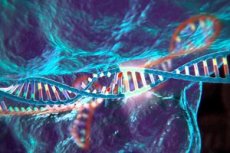New publications
China will begin experiments with human DNA
Last reviewed: 02.07.2025

All iLive content is medically reviewed or fact checked to ensure as much factual accuracy as possible.
We have strict sourcing guidelines and only link to reputable media sites, academic research institutions and, whenever possible, medically peer reviewed studies. Note that the numbers in parentheses ([1], [2], etc.) are clickable links to these studies.
If you feel that any of our content is inaccurate, out-of-date, or otherwise questionable, please select it and press Ctrl + Enter.

In China, scientists have been given permission to conduct experiments with the human genome, and research work using CRISPR/Cas9 technology (“DNA Scissors”) will begin in August. Thanks to this technology, experts will be able to remove defective DNA sections and replace them with new ones, which will help in the treatment of hereditary and oncological diseases.
The experiments will be conducted at Sichuan University and will involve patients with inoperable lung cancer. The technology that Chinese scientists are going to test involves changing T-lymphocytes and, according to experts, it has a number of advantages, especially for hopeless patients.
The PD-1 protein, located on the surface of cells, is responsible for the behavior of immune cells. This protein prevents lymphocytes from attacking healthy cells, but this same protein prevents the immune system from destroying cancer cells. Recent studies with animals have shown that when the PD-1 protein is blocked, lymphocytes are activated and begin to destroy cancer tumors.
At this stage, scientists intend to reprogram T-lymphocytes, having previously “pulled” them out of the volunteers’ blood. The “DNA Scissors” system will remove genes encoding the PD-1 protein, and it is assumed that the lymphocytes will begin to identify atypical cells and destroy them, which will slow down the progression of the disease. The reprogrammed T-lymphocytes will be multiplied in the laboratory and injected back into the patients’ blood.
China is the undisputed leader in genetic engineering. Last year, experiments with defective human embryos showed that the "DNA Scissors" technology did not produce the expected result, so the modified lymphocytes will be administered to patients only after all the necessary tests and analyses have been carried out. The likelihood that the immune cells after modification will not work exactly as expected is quite high. According to scientists, there is a risk that the lymphocytes will begin to destroy not only cancer cells, but also healthy cells, thereby leading to the death of the patient.
According to the researchers, one should not expect a miraculous cure for volunteers' cancer. The experiment involves patients with metastatic cancer, and it would be good if the technology allowed the disease's progression to be slowed down somewhat.

All patients who wish to take part in the experiment are warned of the possible risks, but are ready to sacrifice themselves to save millions of other cancer patients.
Experiments with the human genome are banned in many countries for moral and ethical reasons, but in China they are more lenient about this, so scientists hope that they can become leaders in this field.
The level of research conducted in Chinese laboratories is truly impressive, and the best specialists from all over the world work there, who have access to the latest technical solutions. In addition, science is supported in principle in China, both by society and by the state (it is not a problem to obtain permission to conduct experiments, unlike in other countries) and no myths or fears, such as those that arose around GMOs, can stop scientific and technical progress in this country.
 [ 1 ]
[ 1 ]
